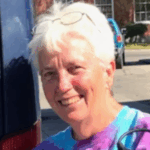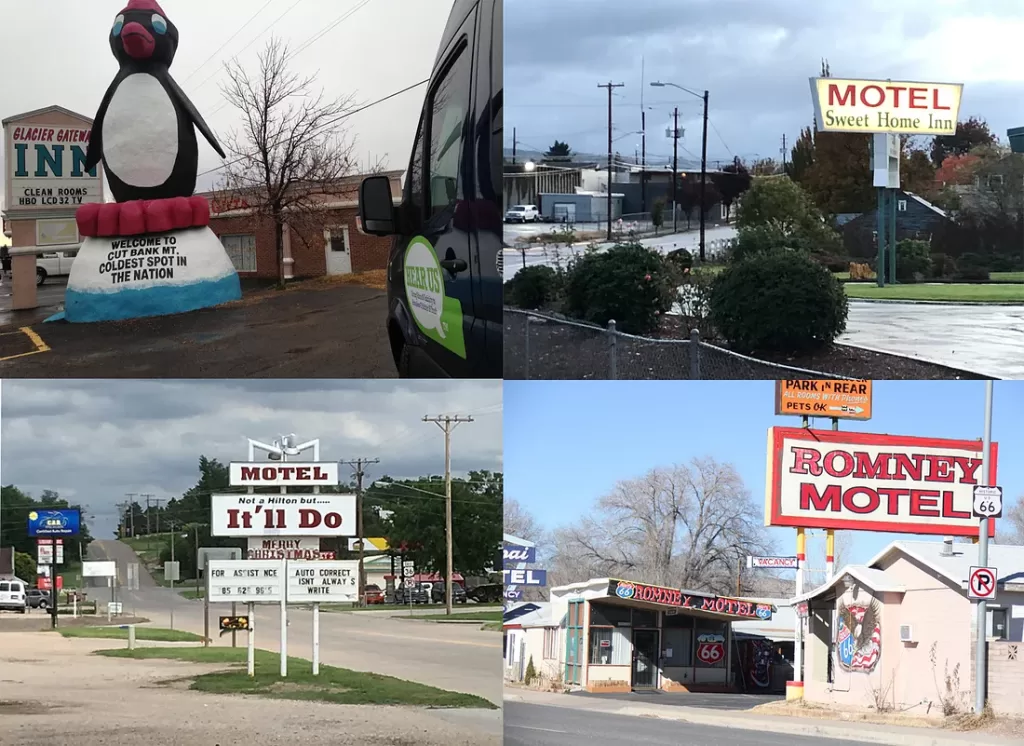
Editor’s Note: This article was originally posted at medium.com and is published here with permission of the author.
As summer rolls around, one group of motel-dwellers will feel the heat the most — families and individuals who’ve lost housing. Motels/hotels welcome tourists in summer, so they want to get rid of the “riff-raff” using these accommodations as a substitute for housing.
In every community, if you look beyond the facade of motels/hotels, you’ll find desperate occupants crammed into these rooms meant for travelers.
Overcrowding, lack of food access, nefarious happenings, local ordinances, and more make staying in these operations far from ideal. This form of “housing” is anything but affordable, often more expensive than rentals, but it doesn’t require security deposits and credit checks, the big bugaboos for getting a place of your own after being evicted.
(I’ve visited lots families in these itinerant accommodations across the country, trust me.)
Who wouldn’t try to find a cheap motel/hotel for their family if they had nowhere else to go? But “cheap” is relevant and it requires the breadwinner, often a single mom, to work long hours to be able to afford these expensive digs.
Family Homelessness 101
When you lose housing — in urban, suburban, or rural areas — the first thing you discover is the abysmal lack of emergency housing. Or what passes for emergency housing is usually horribly inadequate for your family. Or the shelter closes in warmer months, as if homelessness gets easier then.
Richmond, VA officials are examining their apparently failed system of caring for families experiencing homelessness.
“The family with the five kids is sleeping in a broken-down van. They haven’t showered. They haven’t eaten. They don’t have food stamps. They are five RPS [Richmond Public Schools] students,” Lynch said. “All they want, one of the children said, for Mother’s Day is to get them out of a van. Is that the city that we’re living in?” (WTVR, 5/12/23)
This isn’t limited to Richmond. Few localities bother to even pay attention to this common gap.
(I’m a former shelter director; I can criticize.)
Your other choices include “camping,” typically in an old RV or tent, but that option is fraught with expenses and logistical challenges. You can join the invisible masses at “Camp Walmart,” parking and sleeping in your vehicle if you’re lucky enough to have one, but this retail giant is starting to crumble, stores are shuttering and others restrict overnight parking.
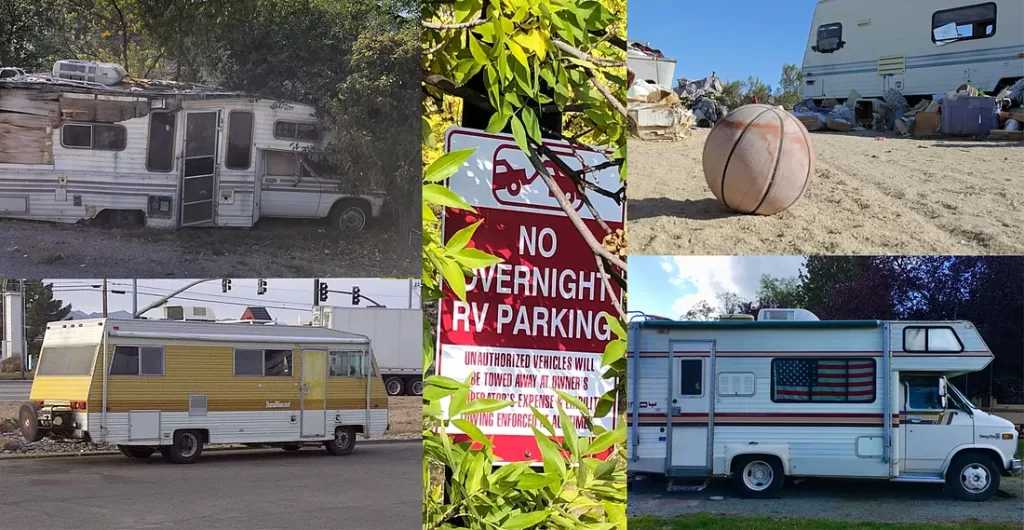
If you haven’t burned through family and friends (aka “doubled up”), you’ll probably circulate between anyone with space for you and your family, hoping you won’t find out that your host is abusing your kids or other horrific possibilities.
(I have heard countless accounts of these hazards from families who’ve experienced them, and I’ve shared the stories here and here.)
Back to the “vacation” theme
If you’re one of the many families in these motels/hotels, you’re probably working full-time, or at a patchwork of part-time jobs to afford the exorbitant daily, weekly or monthly rates. You’ve probably been advised that those rates will increase as tourist season comes or special events take precedence.
“While Goldbaum is working to negotiate longer stays, hotel availability is not consistent throughout the year, he said, with major events like the University of Michigan’s spring commencement bringing many visitors to the area.” (MLive, 4/23/23)
Special events will force you to cough up more money (how many hours a week can you work?) or you’ll have to bail.
(I’ve heard this time and time again, as shared here).
Families Don’t Count, but They’ve Got to Survive
Face it. No one “shivs-a-git” about these families stuck in nowhere-land. The feds say they can’t help them — too many, opening a floodgate, and we don’t have adequate funds — so they don’t even count these families staying on their own dimes as “homeless” (a fight I’ve been in for nearly 20 years).
What would you as a parent say to your kids in these highly-mobile situations? You might say “we’re going camping” with faux enthusiasm because you’re ill-equipped and you don’t know where you’ll be able to “camp,” especially since an increasing number of states and jurisdictions have made camping on public land illegal.
(I’ve camped in illegal spaces and know the unease of this option).
Camping sounds so, ahem, American, but in reality, the campgrounds and unsanctioned spots many families end up at vary between hardscrabble and unsavory. Or you end up in the woods on your own, amongst the critters.
(I know, because I’ve filmed families in these places.)

Over the past two weeks, school-age children started appearing at a large tent encampment on the edge of Georgetown. Though outreach workers and camp residents have urged parents to take them elsewhere, many in the camp expect to see many more arrive by the end of the month, when the state’s pandemic emergency shelter program runs out of funding. (Delaware Public Radio, 8/22/22)
Vital issues of food, hygiene, hazardous weather conditions, and countless perils from whatever options you end up with will make your summer hell. Your kids will act up. You’ll be stressed and unable to work since you don’t have childcare. Health problems will beset you and your kids. You’ll rightfully fear that your kids will be snatched by child welfare authorities
“Summer Time and the Living is NOT Easy…”
…for millions of families across our confused country. Most states are shutting down the Covid-inspired quasi-shelters in hotels/motels that kept millions from life on the streets. Legislators are saying they can’t justify paying for this arrangement, despite receiving a ton of federal pandemic funds.
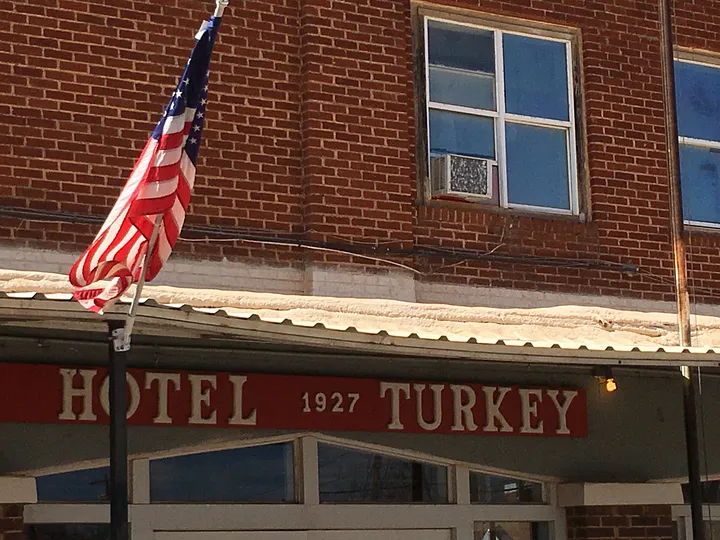
Brenda Siegel, a homeless advocate who was the 2022 [VT] Democratic candidate for governor [stated]:
“This continues to be an abject failure of our state government to prevent a preventable humanitarian crisis.”
What is it about summer that’s fun for kids and families?
Homelessness sure isn’t on the list! I’ve only touched on the issues millions, yes, millions of unhoused families/youth encounter. These are the invisible ones who will be ravaged by a federal debt shutdown. They’re at the bottom of the list for federal, state and local budget priorities.
They face unimaginable hardships and must jump through the most hoops to get what they need to survive. Why do we expect the most from those who have the least?
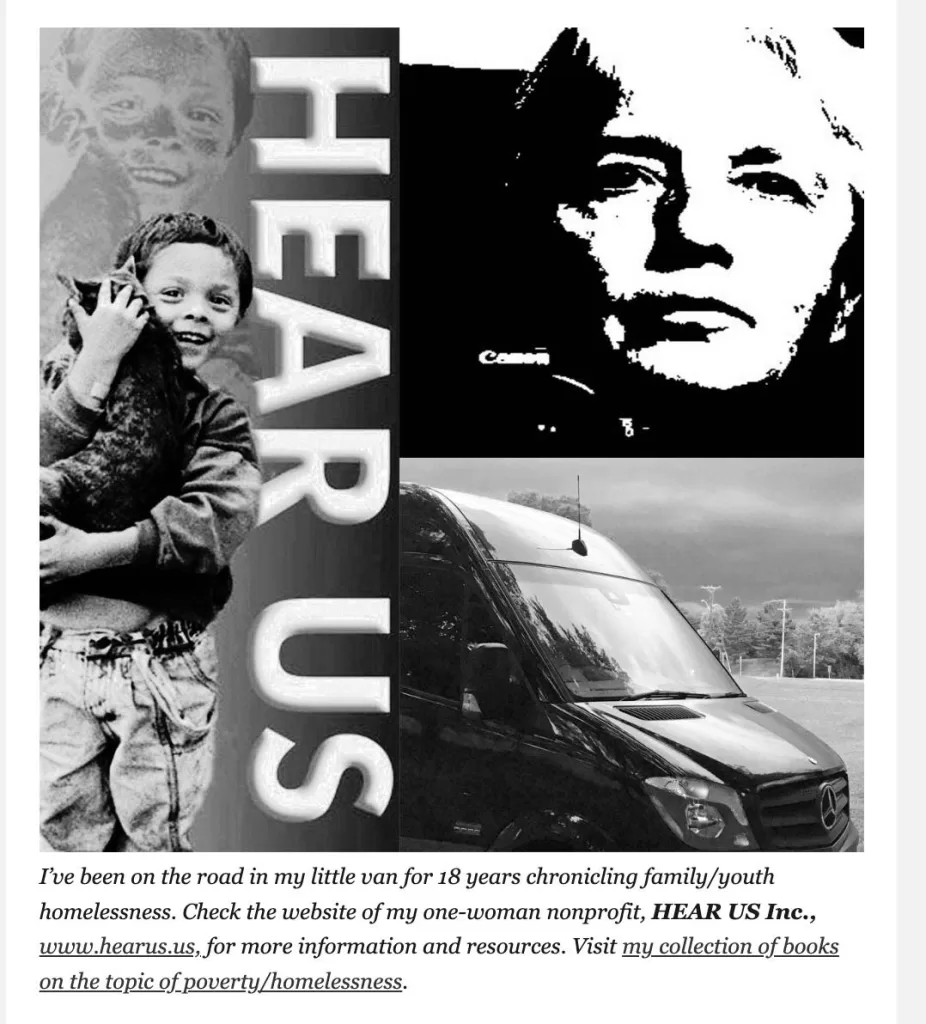
I’ve been on the road in my little van for 18 years chronicling family/youth homelessness. Check the website of my one-woman nonprofit, HEAR US Inc., www.hearus.us, for more information and resources. Visit my collection of books on the topic of poverty/homelessness.
Diane Nilan is President of HEAR US Inc.,an organization that gives voice to families and youth experiencing homelessness. Nilan has devoted her life to advocating for and presenting the real face of homelessness in America, focussing on families and children. She has more than three decades of experience running shelters; advocating for improved state and federal policies; filming/producing award-winning documentaries. Her latest work is the book, Dismazed and Driven: My Look at Family Homelessness in America and The Three Melissas.

